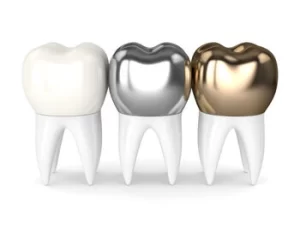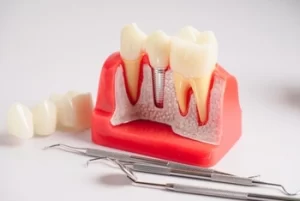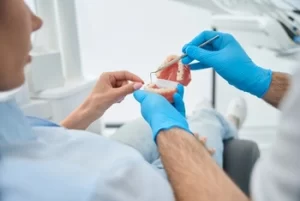A loose dental implant crown might seem like a minor issue at first, but it can quickly lead to further complications if ignored. You might notice slight movement while chewing, an unusual clicking sound, or discomfort around the implant site. These are not things to overlook. Understanding the symptoms of loose dental implant crown early helps you act before damage spreads to the implant fixture or surrounding bone. By learning what to look for, what causes looseness, and when to seek timely intervention, you can protect your implant, oral health, and comfort.
Understanding The Problem: When An Implant Crown Feels Loose
Recognising the early signs of a loose crown is essential for preserving your implant’s stability and preventing pain or infection.
 How Dental Implant Crowns Are Meant To Function
How Dental Implant Crowns Are Meant To Function
A dental implant crown is designed to mimic the feel and function of natural teeth. It attaches securely to the actual implant, which is embedded in your jawbone and acts as a replacement for a missing tooth root. When positioned correctly, the crown and implant structure work together, distributing biting forces evenly across the mouth. This balance allows you to chew comfortably and maintain the health of the surrounding gums and adjacent teeth. A stable implant area should feel no different from your natural teeth when eating or speaking.
Common Symptoms Of A Loose Dental Implant Crown
If your implant crown starts moving or feels slightly out of place, you may be experiencing one of the first symptoms of a loose dental implant crown. Some people describe a noticeable movement when biting, while others feel a subtle wobble that wasn’t there before. Loose dental implant pain can appear as tenderness when applying pressure or discomfort when brushing near the gum tissue. You might also detect a clicking noise or find food trapping easily around the implant site. These signs indicate that something is shifting, and immediate dental attention is necessary.
Why A Loose Implant Crown Should Never Be Ignored
Ignoring a loose crown increases the risk of infection, gum inflammation, or even implant failure. Once the implant crown is loose, tiny movements can irritate the surrounding gums and cause bone loss around the implant site. If left untreated, the entire implant may become unstable, requiring complex procedures such as bone grafting or replacement. Delaying treatment also increases the likelihood of damaging adjacent teeth and the prosthetic tooth itself. Acting quickly protects both your oral health and the long-term success of the implant.
The Difference Between A Loose Crown And A Loose Implant

Causes Behind A Loose Or Unstable Implant Crown
Understanding what leads to a loose implant crown allows you to prevent future problems and maintain confidence in your dental implants. Each of these causes affects the stability of the crown differently and requires specific care.
How Screw Loosening Or Abutment Movement Affects Stability
Inside most implants is a small screw that connects the crown to the implant fixture. Over time, this screw can shift or loosen, especially if exposed to too much pressure from chewing or teeth grinding. Screw loosening can make the crown move even if the implant itself is secure. If not addressed, the crown may detach completely or place strain on the implant structure. Early intervention allows your dental professional to resecure the screw and prevent more serious issues.
Cement-Retained Versus Screw-Retained Crowns: What Can Go Wrong
Implant crowns are usually attached in one of two ways: cement-retained crowns or screw-retained crowns. In cement-retained designs, the bonding material can weaken, causing the crown to detach. Screw-retained crowns may loosen when the screw connection inside the implant fixture shifts. Each method has benefits, but both require monitoring through regular dental check-ups to ensure the dental crowns attached remain stable. If your existing crown loosens repeatedly, the dentist may suggest a small adjustment or a change in attachment style.
Insufficient Bone Support And Gum Changes Around The Implant Site
For an implant to remain strong, it depends on sufficient bone support and healthy gum tissue. Bone loss around the implant or changes in gum thickness can create movement over time. The surrounding bone and soft tissue act like the foundation of a building when they weaken, the crown can feel unstable. Gum disease or untreated infection can accelerate these changes, reducing support and increasing the risk of implant failure.
How Teeth Grinding And Hard Or Sticky Foods Create Strain
Grinding teeth places constant pressure on implants, crowns, and adjacent teeth. Over months or years, this repeated tension can loosen the implant crown or even the entire implant. Hard or sticky foods can also disturb the seal between the crown and abutment, especially if they pull or twist against the structure during chewing. Patients who grind their teeth may benefit from night guards or bite adjustments. Avoiding sticky foods such as toffee or chewing gum helps protect your crown and prevent discomfort.
The Role Of Gum Disease And Surrounding Bone Health
Gum disease weakens the tissue that holds the implant in place and may affect the surrounding bone. Inflammation around the implant site can compromise blood flow, causing the gums to recede and expose more of the implant. Without treatment, infection can spread to deeper layers and jeopardise the implant’s stability. Treating gum disease early and maintaining consistent oral hygiene keeps the gums firm and healthy. Healthy tissue provides the support every dental implant needs for long-term success in implant dentistry.
Managing And Preventing Further Complications
Once you notice symptoms of a loose dental implant crown, quick action prevents permanent damage. Here, we outline practical steps to manage looseness, seek help promptly, and maintain long-term implant health.
What To Do If Your Implant Crown Feels Loose
If your implant crown moves or feels uneven, avoid chewing on that side of your mouth until it’s examined. Do not attempt to tighten the crown yourself, as this could damage the implant or screw. Book a dental appointment immediately so your dentist can assess the underlying cause. Sometimes the issue involves tightening a loose abutment, while other times the implant is loose or the crown requires replacement. Timely intervention prevents discomfort and keeps the implant area healthy.
 How Early Intervention And Dental Appointments Prevent Implant Failure
How Early Intervention And Dental Appointments Prevent Implant Failure
Visiting your dentist immediately ensures early treatment before the problem worsens. Minor repairs, such as resecuring the crown or reinforcing the abutment, can usually be done in a single appointment. Ignoring symptoms risks implant failure or damage to the surrounding gums. Routine reviews with your dentist allow small issues to be corrected before they require complex procedures. Follow-up visits also help the dental professional confirm that the implant and crown are functioning as intended after adjustments.
Maintaining Oral Hygiene And Regular Dental Check-Ups For Long-Term Success
Good oral hygiene is one of the simplest yet effective ways to maintain implant stability. Brush carefully around the implant with a soft brush, floss gently, and rinse to remove debris around the implant site. This routine prevents gum inflammation and protects against tooth decay on adjacent teeth. Regular dental check-ups provide ongoing monitoring and cleaning around the implant area, ensuring long-lasting results. Consistent care and early attention to changes safeguard both your implant and overall oral health.
Protecting Your Implant For The Long Term
Recognising the symptoms of a loose dental implant crown early helps you take the right action before damage occurs. If you feel movement, discomfort, or notice changes around the implant site, avoid hard or sticky foods and schedule an appointment promptly. Timely care prevents further complications and preserves the strength of your implant. Early treatment from a qualified dental professional ensures stability and comfort for years to come. For personal guidance or to arrange an assessment, contact our clinic today at 07 4801 7035 to book your visit.
Note: Any surgical or invasive procedure carries risks. Before proceeding, you should seek a second opinion from an appropriately qualified health practitioner.
References
https://dentistry.uic.edu/patients/dental-services/general-family-dentistry/guide-to-dental-implants-a-popular-option-for-tooth-replacement/
https://my.clevelandclinic.org/health/treatments/10903-dental-implants

 How Dental Implant Crowns Are Meant To Function
How Dental Implant Crowns Are Meant To Function How Early Intervention And Dental Appointments Prevent Implant Failure
How Early Intervention And Dental Appointments Prevent Implant Failure